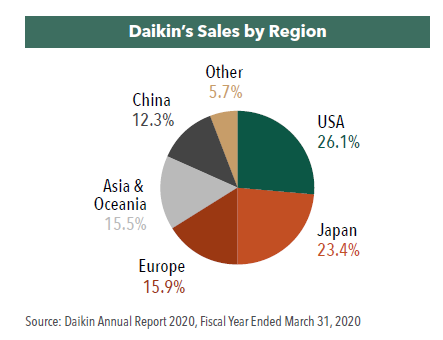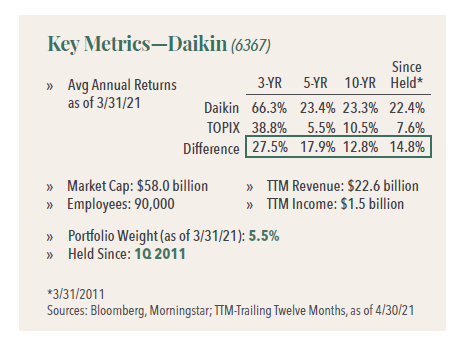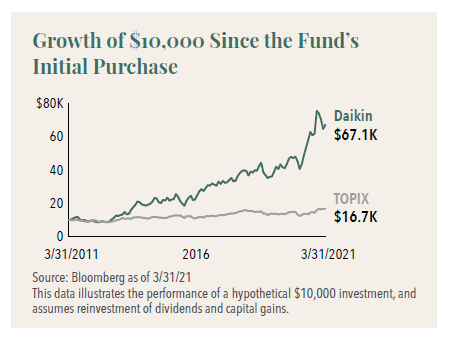Japan Fund Company Spotlight: Daikin Industries, Ltd
Daikin Industries is a global leader in heating and air conditioning products and systems. The company’s investments in the latest technology, partnership philosophy, and well-established blueprint for international expansion make Daikin a dominant company in this growing industry.
-
 Masakazu Takeda, CFA, CMAPortfolio Manager
Masakazu Takeda, CFA, CMAPortfolio Manager
A Global Leader in Heating and Cooling
Founded in 1924 and headquartered in Osaka, Japan, Daikin Industries Ltd. has grown to become a global leader in heating, ventilation, and air conditioning (HVAC) system manufacturing. With over 100 manufacturing facilities worldwide, Daikin offers heating and cooling solutions to both residential and commercial customers in over 150 countries, and the company has approximately 11% of the global HVAC market.
By region, Daikin’s largest percentage of revenue comes from the U.S. The company has invested more than $7 billion in operations and facilities across North America. This investment includes nearly 30 production bases and research and development centers, employing more than 19,000 people.1
The company goes beyond mere fabrication, as Daikin is the only heating and cooling system manufacturing company that assists customers around the globe through the entire product life cycle, from on-site consultation and evaluation to repair and maintenance.
Global HVAC Market Overview
Estimated to be worth approximately $240 billion in 2020, the global HVAC market is expected to increase to nearly $370 billion by 2030, an increase of 52%.2
Within developed economies, centralized HVAC systems have become prevalent in commercial and residential buildings. Primarily, smart home integration, server rooms, and technology environments that require careful temperature regulation are increasingly driving the need for integrated and precision HVAC systems. Additionally, concerns over the environmental impact and rising energy prices have made energy efficiency a priority.
Demand from Emerging Markets is also growing. In fact, emerging countries within the Asia-Pacific region are expected to be the largest and fastest growing markets for HVAC systems, and are anticipated to generate nearly 56% of the industry’s total growth through 2025 and make up 61% of the growth in residential HVAC systems over the same period.3
While COVID-related shutdowns and supply chain interruptions caused a slowdown in the growth of the industry, we believe the pandemic may actually provide a longer-term tailwind for Daikin as customers place a greater emphasis on improved air quality and filtration. Because Daikin’s ductless-type AC systems can prevent the spread of the virus indoors, they are expected to take market share from the duct-type system in the U.S.
Strengths of the Daikin Business Model
1. Growth in demand for ductless HVAC units. Daikin has been one of the pioneers of ductless HVAC unit technology as well as a leading manufacturer. While ductless HVAC systems have been popular overseas and for retrofitting homes without existing ductwork, the greater temperature control, noise reduction, flexible installation, and energy efficiency offered by newer models is projected to grow the market by a 4.3% compound annual growth rate through at least 2026, to a total market value of $178 billion.4 Currently, the highest-end models are even incorporating the technology to sense when a person enters a room, and adjust the temperature accordingly, leading to reduced energy usage and savings.
2. Technological advancements. Daikin has been on the front lines of the HVAC system development since its creation of the world’s first variable refrigerant volume (VRV) HVAC system in 1982. The company’s water-cooled VRV design eliminated the need for outdoor units and its heat-reclamation technology allows a single HVAC unit to provide both air conditioning and heating simultaneously to separate locations. Daikin’s VRV HVAC system has been quickly adopted as the preferred system within the hospitality industry, specifically within hotels allowing customers to independently set their room temperature.
3. Superior customer service. The company’s service specialists partner with its customers to meet their individual needs. For example, in the U.K., Daikin specialists developed a unique solution to comply with the country’s strict requirements on historical renovations. Using a digital photo, Daikin developed a vinyl HVAC unit wrapping, printed to closely match the brickwork to meet the renovation standards.5 By embracing its role as a solutions provider, rather than mere manufacturer, the company has built long-lasting relationships and significant brand loyalty with its customers.
4. Utility and style solutions. In 2020, Daikin’s cassette AC unit, a smaller single-room unit, was named one of the top 100 best products designed by the Japanese Good Design Awards. The design was selected from over 1,000 entries from companies and designers by a panel of distinguished design experts from the Japan Institute of Design Promotion and allows the company to use Institute’s trademark “G-mark” on its product and labeling to convey it as an award-winning product.
Additionally, the company’s Risora line of wall-mounted residential air conditioners have received critical acclaim for their design and functionality. In addition to being the recipient of the Japan Good Design award in 2017, the line was also awarded the international iF Design Award in 2018. Conferred by the iF Industrial Design Forum, an international professional industrial design society, winners are selected by industry experts from over 5,500 entries for their innovation, functionality, aesthetics, efficiency, and differentiation.
Catalysts for Future Growth
Technological Innovation
Daikin continues to be a leader in cutting-edge HVAC technologies. The company has made significant investments into research and development including building a $300 million Technology and Innovation Center campus, complete with the latest research and testing facilities. Additionally, Daikin is focusing on pursuing new and innovative ways to incorporate the latest technology. Daikin engineers and developers are encouraged to pursue possibilities such as using facial recognition software to recognize employee drowsiness and lowering the room temperature to improve their alertness,6 or using automated sensors to track movement through an office building to build an artificial intelligence (AI) algorithm for more efficient temperature regulation.7
Additional Expansion into the U.S.
Daikin continues to view the North American markets as a high-growth opportunity. In 2017, the company opened the Daikin Texas Technology Park, a $450 million, 1.2 million square feet manufacturing facility outside Houston, Texas. The third largest manufacturing facility in the U.S., and the fifth largest in the world, the Daikin factory manufactures all of the residential and commercial HVAC products the company sells in the U.S. Additionally, the campus also includes the company’s largest distribution center, lab space, and corporate offices for approximately 4,600 employees.
Additionally, in late 2020, the company purchased Stevens Equipment Supply, a wholesale distributor of HVAC equipment, parts, and supplies, which operates in 19 states across the American West and Midwest. In 2021, the company made another acquisition of ABCO HVACR Supply and Solutions, one of the leading distributors of HVAC systems and accessories in six states across the Northeast U.S.
Expansion into Emerging Markets
Daikin has made international expansion a primary objective of their overall strategy. The company has over 100 manufacturing facilities spread across the globe to provide proximity to major markets, including the high-growth Asia-Pacific market in countries such as China, Thailand, Malaysia, and India. The company’s reputation for quality and growing international presence has also allowed it to win large contracts to supply HVAC systems for luxury developments in Dubai8 and is helping to design and supply Singapore’s new experimental smart city.9 Daikin is also planning to expand into African markets and has already established a regional headquarters in Nairobi to target the underserved, but growing, markets for residential and small business air conditioning in Kenya and Tanzania.10

A Focus on Providing Healthy Air
In response to the pandemic, Daikin has partnered with the microbiology departments of the University of Tokyo and Okayama University of Science to refine and test its line of Streamer air purifiers against the COVID-19 virus. The result was a 99.9% suppression in virus activity after being subjected to the Streamer discharge for three hours.11 Additionally, the company’s recent launch of its new residential split system air conditioners in Japan are the first to bring in fresh air ducted from outside, providing higher quality air circulation without a loss in heating, cooling, and humidification capabilities.12
Embracing Environmental Standards
Instead of seeing the increase in environmental regulations on the HVAC industry as a burden, Daikin is pioneering new ways to become more energy-efficient and environmentally friendly. The company has partnered with architects to incorporate more energy-efficient HVAC systems in new construction, provide older HVAC system users with a recycling program to reduce the production of high-carbon refrigerants,13 and develop a new high-efficiency and lower pollution refrigerant system which it has installed in over 100 million units globally.14
Investment Summary
Along with the company’s reputation for high-quality, low-cost units, Daikin’s continued research and development into new technology and international expansion plans are providing new and exciting opportunities to grow its market share globally. Additionally, Daikin’s ability to adapt to demands for higher air quality and increased environmental regulations has allowed the company to turn these challenges into potential opportunities for growth. We believe these factors will allow Daikin to continue to be a leader in the global HVAC market, and that the company represents an excellent long-term holding within the portfolio.


- In this article:
- Japan
- Japan Fund
1. Daikin North America April 2021. 2. Statista, 11/18/20. 3. BusinessWire, 9/15/20. 4. Global Newswire, 4/24/19. 5. Coolingpost.com, 10/28/20. 6. ibid., 7/27/18. 7. ibid., 4/18/20. 8. ibid., 9/14/20. 9. ibid., 11/11/20. 10. ibid., 6/7/20. 11. Daikin, 7/16/20. 12. Coolingpost.com, 10/23/20. 13. ibid., 10/19/20. 14. Achrnews.com, 10/5/15.
You might also like
-
 Portfolio Perspective
Portfolio Perspective
Japan Small Cap FundJapanese Small-Caps’ Earnings Resilience and Improving Returns on Capital
 Takenari Okumura, CMAPortfolio Manager
Takenari Okumura, CMAPortfolio Manager Tadahiro Fujimura, CFA, CMAPortfolio ManagerRead the Commentary
Tadahiro Fujimura, CFA, CMAPortfolio ManagerRead the CommentaryIn the following commentary, the Portfolio Managers cover small-cap outperformance drivers, pro-growth fiscal policy, governance reform, yen volatility, portfolio repositioning, profitability and capital efficiency trends, valuation gaps, and their 2026 outlook.
-
 Portfolio Perspective
Portfolio Perspective
Japan FundA Differentiated Portfolio Focused on Margin of Safety and Upside Potential
 Masakazu Takeda, CFA, CMAPortfolio Manager
Masakazu Takeda, CFA, CMAPortfolio Manager Angus Lee, CFAPortfolio ManagerRead the Commentary
Angus Lee, CFAPortfolio ManagerRead the CommentaryThe Portfolio Managers summarize the significant events that drove markets over 2025 and how the Fund remains focused on quality, capital discipline, and valuation, with a clear preference for stock picking over index exposure.
-
 Investment Idea
Investment IdeaCompelling Valuations in Japan
 Masakazu Takeda, CFA, CMAPortfolio Manager
Masakazu Takeda, CFA, CMAPortfolio Manager Angus Lee, CFAPortfolio Manager
Angus Lee, CFAPortfolio Manager Tadahiro Fujimura, CFA, CMAPortfolio Manager
Tadahiro Fujimura, CFA, CMAPortfolio Manager Takenari Okumura, CMAPortfolio ManagerRead the Investment Idea
Takenari Okumura, CMAPortfolio ManagerRead the Investment IdeaJapanese equities are currently trading at compelling valuation levels compared to other developed equity markets around the world and relative to their own historical averages. We believe the Japanese market deserves a closer look.
